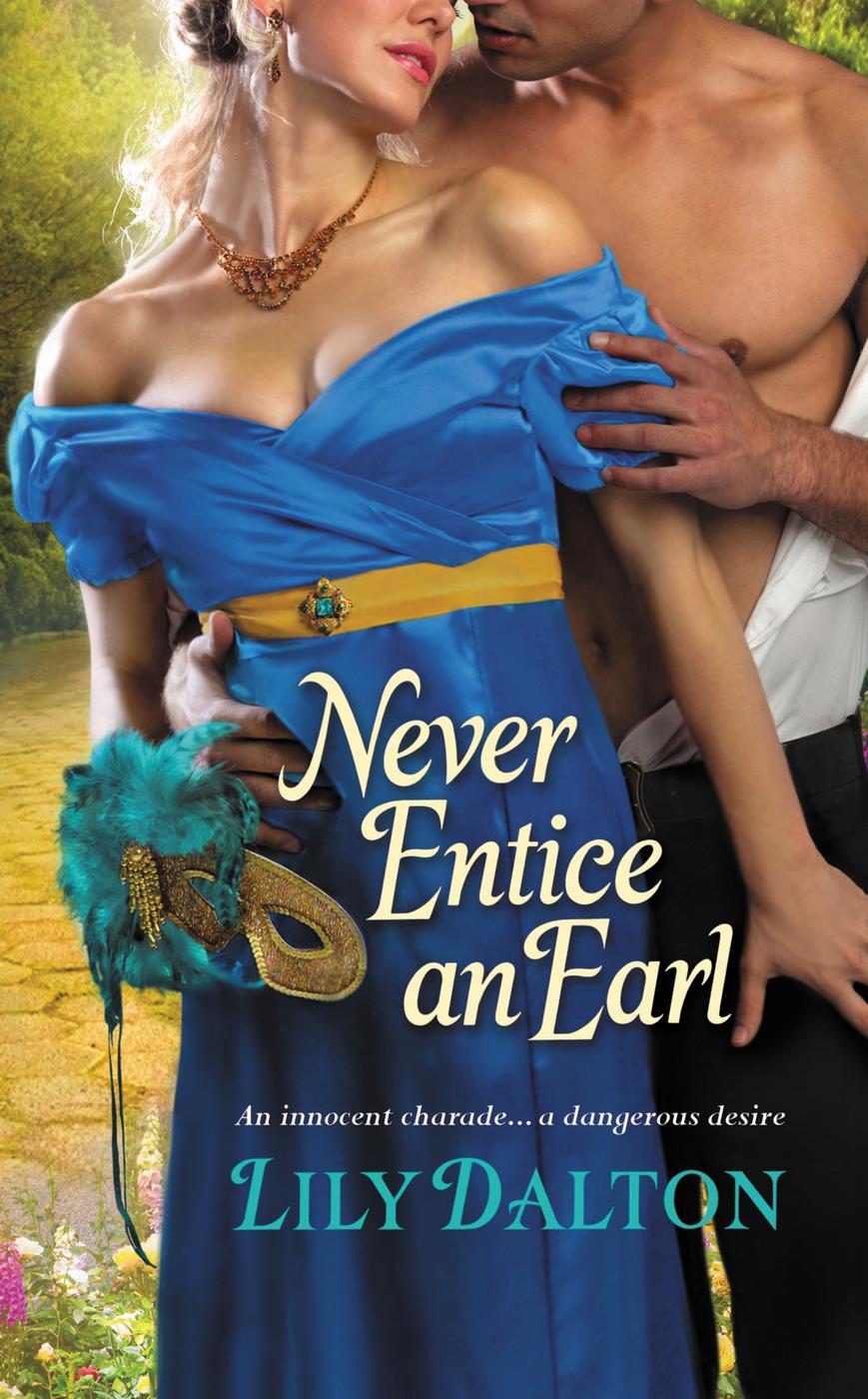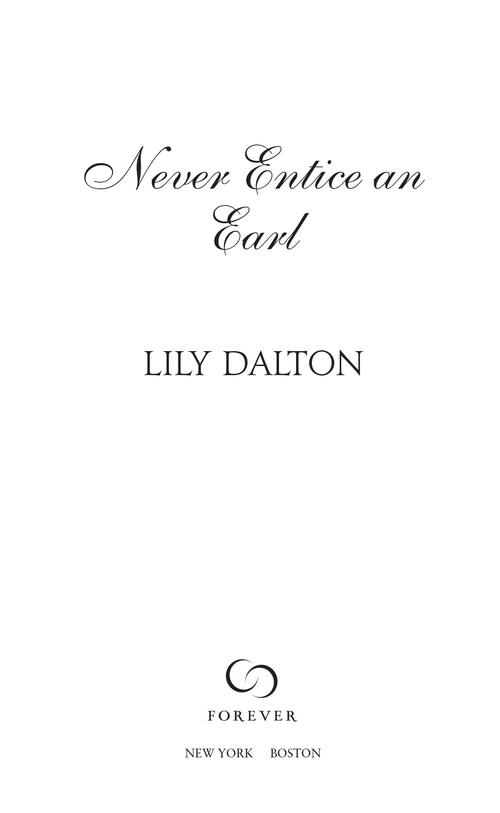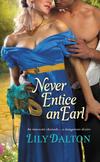Never Entice an Earl
Read Never Entice an Earl Online
Authors: Lily Dalton




In accordance with the U.S. Copyright Act of 1976, the scanning, uploading, and electronic
sharing of any part of this book without the permission of the publisher constitute
unlawful piracy and theft of the author’s intellectual property. If you would like
to use material from the book (other than for review purposes), prior written permission
must be obtained by contacting the publisher at [email protected]. Thank you
for your support of the author’s rights.
For Mom and Dad,
who raised me to believe I could do anything.
I love you both!
With each new book comes the challenge to write a better book than the one before.
As I endeavored to do that, there are so many people that I thanked my lucky stars
for every day, and who deserve mention here.
Such as my husband, who is my real-life romantic hero and anchor every day. And my
two beautiful kids, who never complain when it’s hot dog night. Again. I also want
to thank my writer friends who are a constant source of laughter and encouragement:
Cindy Miles, Shana Galen, Sophie Jordan, Vicky Dreiling, Mary Lindsey, Kimberly Frost,
Tera Lynn Childs, Nicole Flockton, Lark Howard, and all the members of WHRWA. Thank
you for your friendship and your constant support.
There is also my agent, Kim Lionetti, who continues to wholeheartedly support my penchant
for tormented heroes. And my editor, Michele Bidelspach, who I feel also should have
her name on the front of the book for not only her perfect suggestions but all the
coaxing and emotional excavating she does in bringing these characters to life. Special
thank-yous also to Julie Paulauski and Megha Parekh.
Somerset
A
t the first glimpse of stonework through the trees, Cormack Northmore exhaled at least
half
of the breath he’d been holding.
“There she is, as lovely as ever,” he softly announced, smiling and easing away from
the window. From the opposite bench, his three dark-haired traveling companions—his
two mastiffs, Hugin and Munin, and his newly hired footman, Jackson—studied him, bracing
themselves against the cushion as the carriage bounced and rattled over the country
road.
Relieved, he rubbed a hand across his face. The gesture, combined with the perspiration
that had gathered there, caused his upper lip to sting like the Devil, his skin still
being tender from yesterday’s visit to a London barber and his first proper English
shave in months.
He added, “Bellefrost has not collapsed into a pile of rubble, as I had feared. All
is well, just as I hoped it would be.”
All
was
well. Of course it was!
And the disturbingly realistic nightmares he’d suffered in the five months since setting
sail on his return journey from Bengal had been only that—nightmares inspired by the
smothering heat and endless rise and fall of the sailing vessel as it crossed the
ocean to bring him home.
Home. He was almost home. He’d been away so very long, but now excitement welled up
inside him in an effervescent rush.
Again he addressed his fellow travelers. “You, more than anyone, must know how worried
I’ve been.” At that very moment the house appeared again through a break in the trees.
Prideful warmth swelled within his chest. “But look there, the ancestral home still
stands. I have not stayed away too long.”
And yet…there was still the other half of that breath, hovering at the back of his
throat.
Lord, he prayed he’d not stayed away too long.
Again, he shifted to the edge of the carriage seat, feeling as though an army of beetles
marched through his veins.
“I shouldn’t worry so…it’s just that the most recent letters I received from my mother
and father, and likewise from my sister, Miss Northmore, are months old, delayed as
all letters are when one has taken residence on the far side of the earth. So much
could have happened. I realize that lives change and events occur, but my family has
suffered enough hardship. Certainly when I cross the threshold of Bellefrost, I will
find everyone well.”
But did he truly believe that? Nearly suffocated by impatience, he pushed open the
window, granting entrance to a brisk northern wind, and at long last simply breathed.
Hugin and Munin joined him at the window, whining and drooling. They were dogs, after
all, his protectors and companions for the last six years. The conveyance rumbled
down the familiar rutted road, lined on both sides by towering black pines. No matter
where he had wandered,
this
had always been home.
“How I’ve craved that smell,” he said. One formed of
earth
and
rain
and
all things rich and green
.
“It is delightful indeed, sir,” said Jackson, straight shouldered and proper in his
uniform. Not whining or drooling.
Cormack had taken an instant liking to the young man, and when he’d grown bored of
the ride and of talking to the dogs, he’d insisted Jackson travel inside with him
rather than the perch on the back of the carriage, which seemed more designed to rearrange
a fellow’s bones than to provide him with a comfortable means of travel. He would
have invited the driver as well, but unfortunately someone had to mind the reins.
Jackson continued on, “It’s been a long time since I’ve smelled anything but the soot
and stench of London.”
“I myself have always preferred the country.” Cormack returned to the window and inhaled
again.
But there, in the farthest reaches of his nostrils, or perhaps only in his mind, hung
the stench of saltpeter, proof his experiences in Bengal had stained him to his very
soul. But Bengal—and the fetid fields that he’d worked and cultivated until his soul
bled—had made him rich. That was because his efforts had resulted in mountains of
saltpeter, an ingredient necessary for the production of gunpowder, for which England’s
war machine had an unquenchable thirst.
Without question he would do it all again and suffer those hardships just to be able
to give his family the gift he was about to bestow upon them: an absolute peace of
mind—and the means by which to regain possession of ancestral lands that seven centuries
of Northmores had married and warred and died to keep. The very same properties his
dreamer of a father had been forced to sell nearly ten years ago after a series of
calamitous investments in the fanciful electric and mechanical inventions that had
always so intrigued him.
“Miss Northmore, sir, will she be here to welcome you as well?”
“Unfortunately, no,” he answered, remembering his sister as she’d seen him off that
day, with tears in her eyes and sharp words on her tongue that he alone should bear
the burden of correcting their father’s mistakes. Of course, the moment Cormack had
disembarked from England, she had secured employment for herself, determined to contribute.
“She is a governess in the neighboring county, for a family by the name of Deavall,
in charge of their three boys. According to her letters, they love to fish and climb
and play mischievous tricks—which makes her a perfect companion for them, because
she is adept in all of those activities as well. But they will have to make do without
her now.”
It would give him such pleasure to travel there tomorrow and inform her that she could
give her notice. Though like him, Laura had passed beyond the first blush of youth,
she was still young. With the very generous marriage settlement he could now bestow
upon her, she could marry well and have the family of which she’d always dreamed.
But he had not worried about Laura as much as he had his parents. His father had grown
frail over the years, burdened by the toll his dreams of fancy had taken on those
he loved. But Cormack had never loved him less. How could anyone despise a dreamer?
And his mother, of course, loved his father to distraction, so the elder Northmore’s
pain—and shame—had been hers as well. He could not wait to see them, to let them know
the dark days they had endured were now over.
Cormack tugged the leather cuff of his glove. “It will only be a moment now.”
All at once, Jackson jerked and sat straighter.
“Curse me for a fool!” he muttered.
He rapped his gloved knuckles on the roof.
“What is it?” Cormack asked, as the carriage slowed.
Jackson grinned. “It won’t do for you to arrive sitting in a carriage in the company
of your footman. We’ve got to give you a proper entrance.”
When the conveyance slowed his manservant leapt out, leaving Cormack alone with the
dogs, who did their best to follow, butting their heads at the closed door and
woof
ing in complaint. Moments later, the carriage again jostled to a halt and Jackson
held the door as he descended the iron step.
“Welcome home, sir.” He winked, standing with his chest puffed out.
Hugin and Munin, penned inside, whined from the window as he left them behind. With
each step toward the door, happiness welled higher inside him, a bubbling, elated
fountain of love and affection and memories, both joyous and painful. There had been
days when he’d doubted this moment would ever come. Interestingly, a horse and wagon
already occupied the drive, likely only the vicar, come round for his obligatory monthly
visit. The house had thronged with visitors once, but everything had changed with
the collapse of their fortune. Invitations from the local landed gentry had become
rare, and social callers had simply ceased to call.
Soon all that would change. While today the gardens were overgrown and fractured slate
shingles marred the expanse of the roof, tomorrow he would hire men from the village
to undertake all the necessary repairs, and of course a full staff to tend to the
house, much of which had simply been closed off in recent years and gone unused. In
no time, Bellefrost would be returned to every bit of her former splendor—
splendor
being a relative term, of course, as the Northmore estate could truly only be considered
modestly splendorous when compared to the great country estates of the titled wealthy.
Such as the home of his father’s second cousin the Marquess Champdeer, who in the
Northmores’ time of need had refused them all assistance and taken every opportunity
since to chide them over the loss of their fortune and lands.
On the top step, Cormack took a moment to pause and glance over his shoulder.
Perhaps he wasn’t a nobleman like Champdeer—but by God, he looked like one. He could
not imagine that under any circumstances the Almighty would consider the pride he
felt in this moment a sin. In London he’d chosen every glorious, ostentatious detail
with care, from his boots to his coat and hat, to his magnificent equipage, intending
to convey his wonderful surprise without words. Piled high on top of the vehicle were
chests and boxes, packed with luxuries brought with him from Bengal and Bond Street.
Perhaps even now, his father looked out from the window of his study and wondered
what illustrious visitor paid him a call.
With those fine thoughts foremost in his mind, he rapped on the door and waited…yet
his knock brought no answer.
Anxiety tripped along his spine, but no…he felt certain that their elderly butler,
old Jessup, who had remained with the family even after their decline into poverty,
had simply not heard the knock. Perhaps even time had claimed the old fellow, a sad
but very real possibility.
After the third attempt, Cormack opened the door himself and peered into the darkness
of an unlit house with all its curtains drawn. The scent of damp and soot met his
nostrils, the result of chimneys and carpets and plaster gone too long without the
daily attentions of a skilled staff. For a moment he feared the place had been abandoned.
But then, from out of the darkness shambled a familiar figure.
“Jessup!” Cormack laughed, immensely relieved, and strode forward to greet the old
man.
Jessup wore a rumpled suit of clothes and an off-center cravat. Wiry gray hair encircled
his bald pate. He froze upon seeing Cormack, his gaze rheumy and wet behind rectangular
spectacles.
“Oh, sir.” He lifted shaking hands toward Cormack, and then turned toward the interior
of the house, gesturing. “You must hurry. The doctor says there isn’t much time.”
It took a moment for the words to filter through, and as they did, the smile faded
from Cormack’s lips.
The doctor? Not much time?
His father.
Everything inside him, every nerve and muscle and cell, seized in instantaneous grief.
Let his father be alive and lucid. Let there be enough time, at least, to tell him
he had done as he had promised, that they could at last buy the family lands back
from their neighbor, Sir Snaith, and that the good name and the pride of the Northmore
family had been restored.
He rushed past Jessup, his heart already half-consumed by grief.
“Laura has come home to be with my mother?” he asked of the old man as he passed.
He would not want his mother to have been alone at a time like this.
Jessup nodded, his lips turned downward in sadness. “Upstairs.”
On the landing Cormack gripped the banister and launched himself up, two at a time,
and traveled the dark corridor until he arrived at the doors of his father’s room.
He pushed inside, expecting to see Laura there beside their father’s bed, his mother
and the physician—
But the room was dark and empty, and the bed neatly made.
“No, sir,” said Jessup, who lumbered behind him, breath wheezing from his lips. He
pointed down the hall.
Down the hall to—
Realization trickled like shattered ice along Cormack’s spine.
In that moment, Jessup appeared to age another ten years, as his mouth sagged and
his shoulders slumped. “I thought you understood, that you must have heard somehow—”
No, God, please. No.
As if bound by a terrible dream, he continued to the end of the hall, to Laura’s room,
across the corridor’s threadbare carpet from the one he had occupied as a boy. There,
instead of his sister’s familiar lilac scent, the sharp tincture of camphor weighted
the air.
At the door there stood a thin, kind-eyed woman dressed in the apron and cap of a
nurse. Her gaze met his, wide with regret, and then she blinked and looked away. Inside,
two small lamps provided light. Dr. Graham, who had tended them when they were children,
stared out the window, arms crossed over his chest. Cormack’s mother sat in a chair
beside the bed, in a dark gown, her eyes closed and her hands clasped, whispering
prayers. In the six years since he had last seen her, her hair had turned from brown
to completely gray. His father stood beside her, narrow and gaunt and impossibly old,
his hand on his wife’s shoulder.
Laura lay in the shadows of her curtained bed, small and thin beneath a neatly turned
blanket, her face turned to the wall. Her long, brunette hair streamed across the
pillow, so much darker than his own.
“Laura?” He’d intended to speak in a tone of reassurance, but his voice broke under
the weight of his emotion.
His sister did not turn her head—she did not move—but his father jerked toward him
and his mother stood, her Bible thunking to the floor.
“
Cormack
,” they cried, together all at once, and rushed toward him.
He pressed a kiss to each of their faces, and glanced into their stricken eyes, but
broke free of their embrace. Somehow he forced one foot in front of the other, over
the dark green carpet. His heart pounded so hard that he could scarcely breathe. He
wanted nothing more than to see Laura’s smile and to hear her voice, the one he’d
heard so clearly in his mind when reading her letters for the past six years, always
charming and convivial, so like her. Yet at the same time, his heart demanded that
he turn and run out of this room and out of this house, because seeing her would make
the tragedy real.
